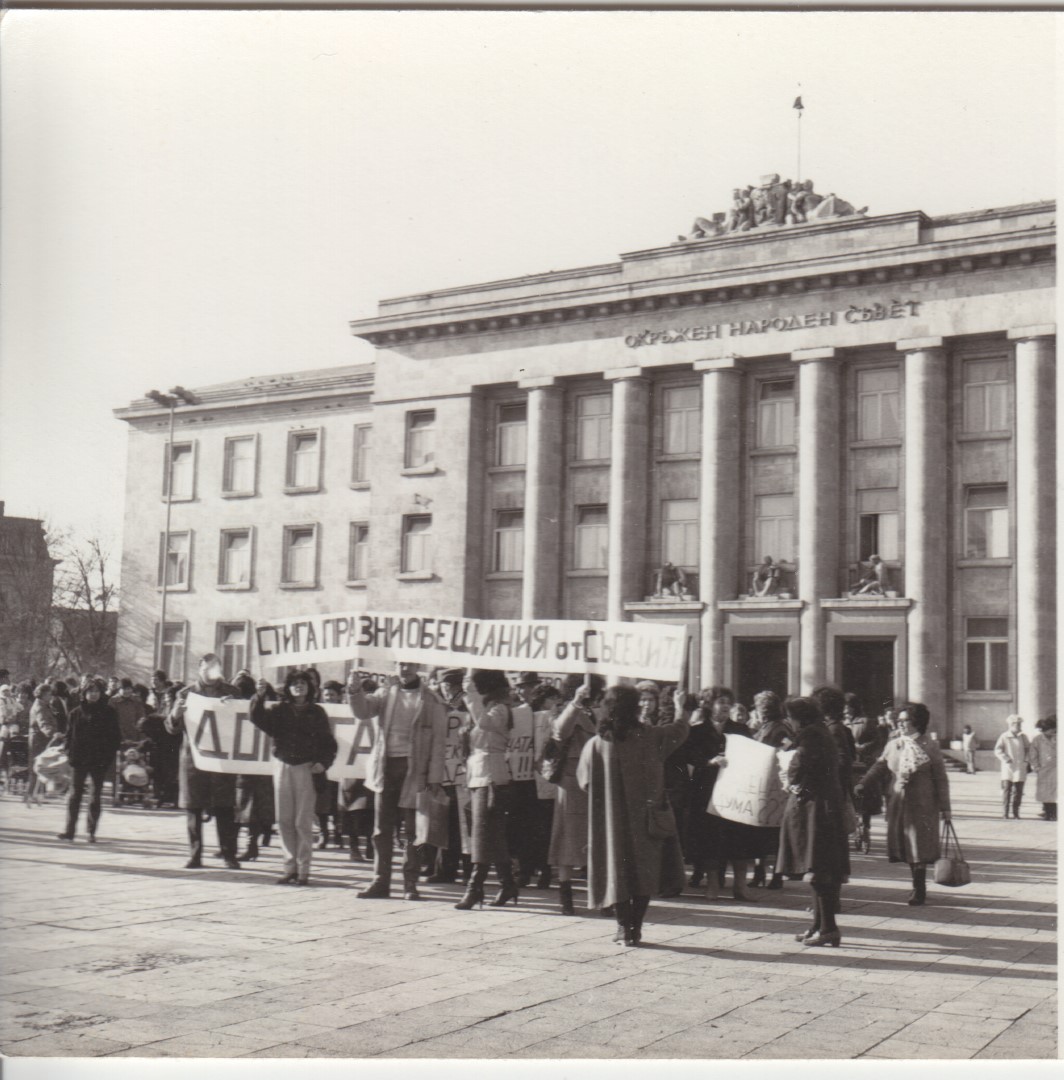The collection is relatively small, but sheds light on one of the first and most important civic and ecological mass protest movements in Bulgaria during the 1980s.
The reason for the protest movement was air pollution caused by an industrial chemical complex in Giurgiu, on the Romanian side of the Danube River, just across Ruse. This plant was built in the early 1980s, and its emissions caused a serious pollution problem in the neighbouring city of Ruse, in Bulgaria. Since the factory was part of the military-industrial complex of the Warsaw Pact, its work could not be halted. Chemical plants in Ruse also contributed to high levels of air pollution, which created serious health problems for the local inhabitants. This was well known to the Communist party and the state leadership in both countries. Yet, the governments sought to conceal the problem; it became a taboo subject not to be debated in public (although at that time, in both countries laws for the protection of the environment were already in place).
On 28 September 1987, more than 300 people protested in Ruse against the unbearable quality of air in the city, which suffered from the emission of toxic gases. The protest is considered the first street demonstration during communist rule in the People's Republic of Bulgaria. The first relatively limited protest was followed by a second one in November 1987, which gathered several thousand people (estimates put the crowd at 6,000). This mass demonstration entered into history as a "protest of mothers with baby pushchairs". Neither radio nor television or even the press reported on these protests. Documentary filmmaker Yuri Zhirov, however, documented the protest and produced the documentary movie "Breathe". This film would play a major role in subsequent events.
On 8 March 1988, film director Malina Petrova organized a screening of the movie "Breathe" at the House of Cinema in Sofia. More than 400 intellectuals, journalists and people with anti-totalitarian attitudes were invited. The event was observed by agents of the State Security. The film left such a strong impact on the viewers, and immediately after the screening the “Public Committee for Environmental Protection of Rousse" was established, which spontaneously attracted a number of supporters. Writer George Mishev was elected chairman of the Committee. The Committee could not develop activities as such because the Central Committee of the Communist Party and the State Security took immediate action against its founders. Nevertheless, it was the first formal anti-totalitarian organization in socialist Bulgaria, opening the doors for the creation of other organizations. During the subsequent months, other dissident organizations were established, such as: the Club for Support of Glasnost and Perestroika (Klub za podkrepa na Glasnostta i preustroystvoto) founded by well-known intellectuals (Zhelyu Zhelev, Evgenia Ivanova, Antonina Zhelyazkova, Georgi Mishev, Blaga Dimitrova, Radoy Ralin, Maria Boykikeva, Nikolay Vasilev and more than 80 other members) in Sofia on November 3, 1988; the "Civic Initiative" (Grazhdanska initsyativa) founded by Lyubomir Sobadzhiev in Ruse in December 1988) (http://www.omda.bg/public/biblioteka/kalin_yosifov/nachaloto_na_sds_dgi_novo.htm).
The protest events in Ruse gave rise to environmentalism in Bulgaria. On April 11, 1989 the “Independent Society Ekoglasnost” (Nezavisimo Sdruzhenie Ekoglasnost) was established. It focused on several major environmental issues. Ekoglasnost organized public petitions, lobbying and demonstrations against the controversial projects to divert water from the Struma and the Mesta Rivers to the north and against the building of the Belene Nuclear Power Plant. It also undertook actions for the preservation of natural heritage.
Environmental, human rights and political issues were closely intertwined. The mentioned organizations rapidly gained public support and played an important role in the political process that ultimately led to the downfall of the communist ruler, Todor Zhivkov, on 10 November 1989. The “Independent Society Ekoglasnost”, for example, became a founding member of the umbrella opposition party “Union of Democratic Forces”, which was established on 7 December 1989. Ekoglasnot was also behind the establishment of the Green Party of Bulgaria three weeks later, the creation of the “Political Club Ekoglasnost” in March 1990, and of the “National Movement Ekoglasnost” in June 1991.
The items and photos preserved in this collection were gathered by the curators of the “Contemporary History” Section of the Regional Museum of History in Ruse. Collecting started immediately after the downfall of the communist system, when the protests against environmental degradation were still ongoing. The last protests of this type were held in 1991.

